Practical Magic is called a romantic comedy, and that’s funny because its leading man doesn’t show up until well over half the film’s runtime has elapsed. (It’s also based on a book of the same name, though they don’t resemble each other very much.) I suppose it is a romantic comedy in that many parts of the film are funny, and there’s a lot of romantic stuff in it. The romance is basically a tangent that occurs so that the story has a thought to end on, and it’s perfectly nice. But really, more than anything, Practical Magic is about how important it is for women to have other women in their lives for the sake of their empowerment and protection. And that’s really it.
Also witch stuff. And tequila.
The story begins with a flashback to the Owens family ancestor Maria, a woman destined to be hanged in her colonial town for practicing witchcraft. While she avoids her execution—due to the witch thing—Maria is also pregnant, and the father of her child never comes to find her on the island where she is exiled. She casts a spell on herself to never fall in love again, but that spell becomes a curse that kills every man who falls in love with a woman of her line. The latest in that tragic tale is Regina, who dies of a broken heart when her husband passes, and leaves her two young girls Gillian (eventually Nicole Kidman) and Sally (eventually Sandra Bullock) to be raised by their aunts, Frances (Stockard Channing) and Jet (Diane Wiest).
The aunts have a different idea of what raising responsible adults should mean, and they teach the girls magic and mischief, but that doesn’t stop them from being bullied by a fearful town that knows their family history obliquely. Eventually Gillian leaves with a hunky guy-of-the-month, and Sally gets married and has two girls of her own… only to lose her husband when the curse strikes. She finds out after his death that the aunts actually caused her husband to fall in love with her, never expecting her to love him back, just assuming that her desire to be “normal” would keep the relationship strong. Gillian gets herself into hot water soon after, when her latest boyfriend turns out to be an abuser and murderer. Sally comes to her sister’s aid and they accidentally kill the man while trying to escape him, leading them to enact a very bad spell to bring him back from the dead. When he returns evermore terrifying, they kill him again, but his spirit remains, and this forms the crux of the plot.
There are aspects of the film that are unbelievably dated. Song selection is one of them; the film frequently has major emotional moments occur with jarring soundtrack choices that feel like nothing-so-much as “some teen over there must be blasting the radio from their parents’ car while waiting to pick up a sibling from soccer practice” because that’s the only way you can make sense of hearing Faith Hill when Sandra Bullock jumps into the arms of a farmer’s market attendant and then promptly marries him. The score itself by Alan Silvestri is pristinely executed, but the frequent sprinkling of Stevie Nicks, Joni Mitchell, and Marvin Gaye make the film feel like it’s trying way too hard to convince us of… something. On the other hand, it does contain the only acceptable use of Harry Nilsson’s “Coconut” on film, which occurs during drunken revelry while Gillian and Sally and their aunts pound back an inadvisable amount of tequila in the middle of the night, as is apparently family tradition. (Please adopt me.)
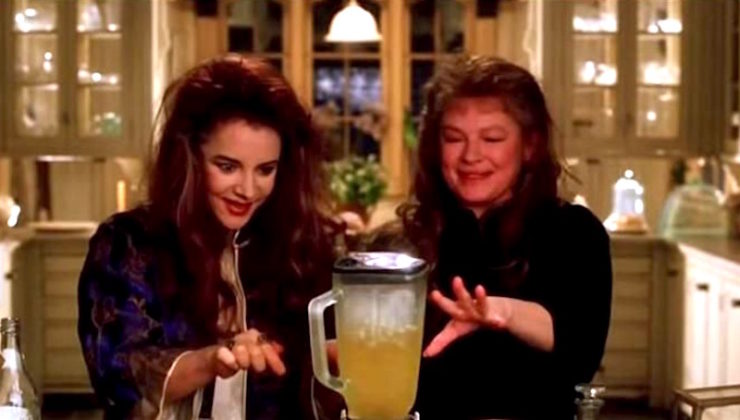
There are other very obvious ’90s markers, including the fashion choices for the sisters, awash in spaghetti strap everything and light wash denim and weird belly shirts. Also, the population of the Northeast town they live in is completely, painfully stark white. (This is the part where someone decides to point out that there are towns in the United States that are completely and utterly white, and then I reply “Yes, but this is a movie that takes place in a fictional town that’s never even named, and creating a film about the power of female relationships that somehow contains literally no women of color is a really incredibly terrible idea, full stop.”) And the CGI, which could be worse all things considered, but still can’t make fake frogs look real or fake vines grow in a way that doesn’t look like a cartoon. Some of these aspects will read as more charming now, some will not, but given our bent toward nostalgia and how the ’90s are “in” again, it’s fascinating either way.
This is a story about heartbreak, but specifically about how people process heartbreak differently, and how heartbreak more often stems from a lack of belonging than a lack of romance. The town hurts Sally and Gillian, as do the deaths of their parents, but Sally tries to combat that hurt by pinning herself down at the corners so she can fit in. She ignores magic and does her best to be a wife and a mother and a small business owner. Gillian rebels against the constraints of the town and runs far away, searching for fun and friends, but most importantly searching for someone who might be “strong enough” to outlast the family curse. It’s this need that leads her to Jimmy Angelov (Goran Visnjic), and this need that blinds her to countless warning signs that he’s a dangerous man.
The film is surprisingly astute in its depictions of abuse and depression; Sally’s plea to the aunts to bring her husband back with magic even if it means he’d be something other than himself is straight from the bargaining step of grief. Later, Gillian does her best to pass off the beating Jimmy gives her, telling Sally repeatedly that she’s fine when her sister comes to pick her up and take her home. Jimmy’s reason for hitting Gillian is totally mundane—she corrects him on what’s in a jelly doughnut. The idea of a witch accidentally cursing her entire family due to being nearly executed by her town and exiled away from all human contact seems a reasonable response to being shunned and left alone on a cold island to build a cabin and have a baby.
There could have been an awful dichotomy made out of the sisters, setting them against one another in a mother/whore dynamic, and though they do butt heads in disagreement over each other’s lifestyles, the language of the film doesn’t prioritize this notion. Gillian is never portrayed as though she deserves what happens to her because she dared to be (gasp!) promiscuous, and the housewives of their hometown who gawk and stare and act appalled by her behavior are not framed as righteous or knowledgeable or even remotely kind.
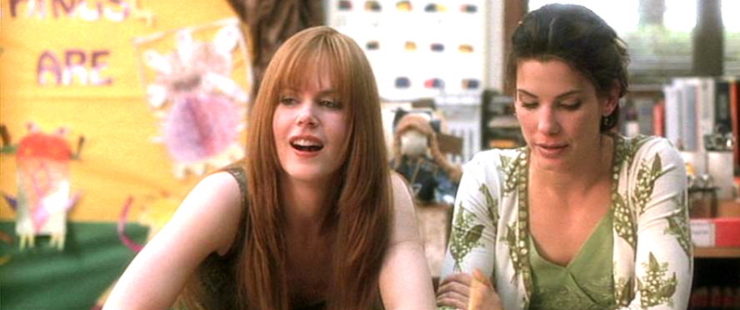
There is an association of witchcraft with freedom throughout the movie, in ways large and small. The aunts take Sally’s daughters to a solstice celebration when she goes to find Gillian, and she warns them beforehand that she doesn’t want her kids dancing naked under the full moon. Frances and Jet remind her that part is optional, and Sally’s daughters return from the trip having done it anyway. Gillian’s access to belladonna is the only thing that saves her from Jimmy, acting as a sedative and later a poison. When Sally is small, her magical gifts allow her to create a spell, calling for a man with traits she imagines don’t exist as a form of protection against ever falling in love, and that spell helps her feel safe as a child. Magic is a way for the women of the Owens family protect themselves and live as they did prefer to live (even if meddling in it incorrectly can lead to untold troubles).
Buy the Book
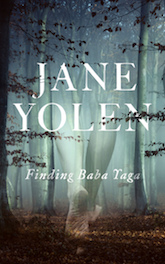

Finding Baba Yaga: A Short Novel in Verse
The film is called “Practical” Magic for a reason, and the type of witchcraft the story is interested in raising up are the uncanny connections people build between one another and how we imbue the unremarkable with meaning. Perhaps the most romantic scene in the entire movie comes when Sally talks to Inspector Hallet—the man called by her impossible spell, there to investigate the murders Jimmy Angelov committed, along with his disappearance—and tries to explain why the town thinks of them as witches, how their magic truly functions. She takes his badge, looks at it and says, “It’s just a star. Just another symbol. It can’t stop criminals in their tracks—it has power because you believe it does.” When Sally and the aunts later call the curious women of the town together to form a coven and help banish Angelov’s spirit from Gillian’s body (Sally summons the coven by “activating the phone tree,” another commonplace bit of magic used by the town moms to alert other mothers of storms or schooling closings), the women gather in the kitchen with their own household brooms, an everyday item with untold might.
But in the midst of all this, the core of the story isn’t only about female solidarity and bonds—it’s explicitly about the importance of having female peers as a woman. We begin the story with a tale of ancestry, of Maria’s curse and then Regina’s death when she loses the man she loves. From a distance, it may look like a legacy of dead women and the men who had power over their hearts, but the truth is more painful than that; Maria’s curse, Regina’s death, they happened because these women were alone. Sally is tied by that same anchor of depression that likely took her mother when her own husband dies, unable to leave her bed, too exhausted from sadness to move. Her daughter Kylie (Evan Rachel Wood) tries to get her up, but she can’t manage it. Then Gillian, feeling her sister’s pain from hundreds of miles away, drives home for a night and crawls into her sister’s bed, and tells her that she needs to brush her teeth and raise her kids and keep going. And Sally does.
Gillian stops Sally from dying of a broken heart. Sally stops Gillian from dying at the hands of an abusive lover. Aunt Jet and Aunt Frances keep each other alive with bickering and frankness and companionship. Sally stays afloat in a town that’s afraid of her by virtue of her two friends and employees, Linda (Margo Martindale) and Carla (Chloe Webb). Gillian is saved when the more suspicious and vitriolic women from town decide to finally let go of their fears and superiority, and join a literal witch’s coven to help a member of their community. Sally’s true love, Inspector Hallet, can’t do this for her. She needs women—she needs women’s magic—to vanquish evil and keep her heart safe.
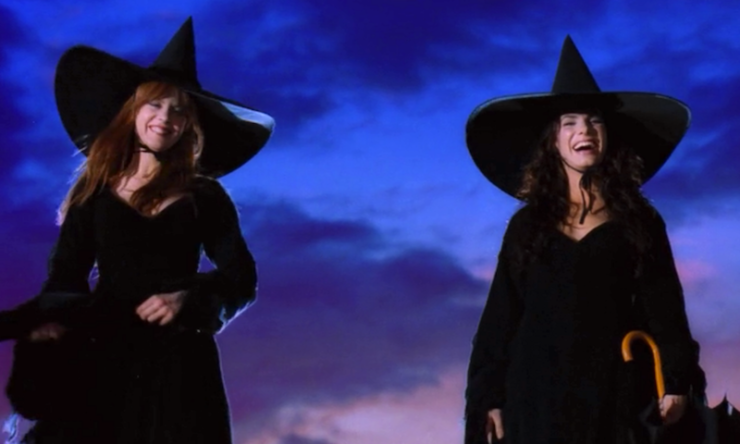
And though the aunts bring the magical knowhow, and the townswomen bring the numbers, the thing that stops Jimmy’s festering spirit is another moment of practical magic. As younger women, Gillian and Sally once cut their palms open and pressed them together in a pact: “My blood. Your blood. Our blood.” They would grow old together in the same house with a million cats. So Sally performs this ritual again and is pushed into the center of the spell circle with her sister, and that pact is renewed—and a small moment from the past, enacted with a pocket knife, saves Gillian all over again.
It’s no surprise that this breaks Maria’s curse. The curse on the Owens women was created out of isolation and fear and loneliness, so it is only fitting that an act of unity and community and love would break it. Romance is incidental in this tale. Sisterhood and friendships are what sustain us and perpetuate our stories. They are the reason we endure. They keep us alive when the world tries to contain, control, or vanquish us.
And that’s a practical magic of its own.
Emmet Asher-Perrin is annoyed that there are not more witch movies where people assemble covens in their living rooms. You can bug him on Twitter and Tumblr, and read more of her work here and elsewhere.










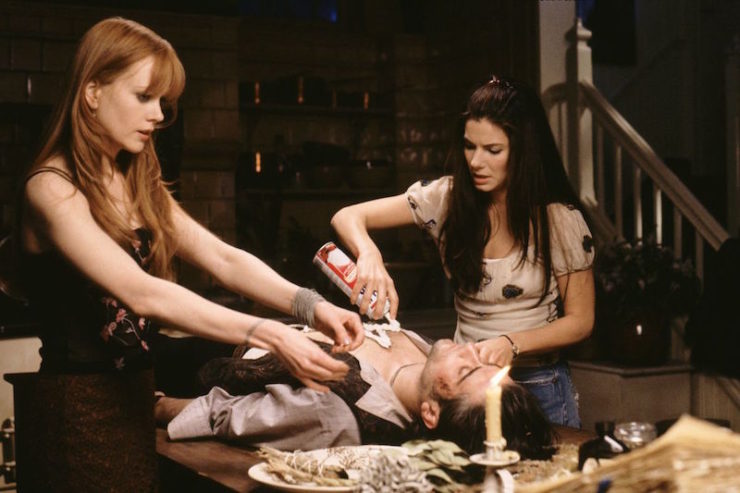
It has been a long time since I watched that movie. I don’t remember the bit at the end where they broke the curse. For some reason, I thought it WASN’T broken and that the movie ended with acceptance (by the community, of who they are, of their lot in life, etc.) rather than victory over the curse (with all the rest).
I need to watch it again.
I have loved this movie for so long and I predict I will until I die, dated fashion and song choices be damned! Teen-me was so let down to learn that the house was built for the movie and I couldn’t live in it myself someday.
I remember being disappointed in the book when I read it as a teenager but fifteen years of distance on, I can see that it is its own kind of magic. The prequel, Rules of Magic, was absolutely lovely and I highly recommend it; the sisterly connection is present again, this time set in 1960s NYC with the aunts as young women.
I’ve watched this film ages ago, but now that I have read the article, I realised it was more comlpex than I remember. I must rewatch it.
I’m surprised it is consider a rom-com, as you mentioned, the romantic interest doesn’t show up until late in the movie. It’s mostly about a sister’s relationship.
*Hums* “She put the lime in the coconut, she drank ’em bot’ up …“
I should watch it again.
And that’s all that needs to be said right now.
I love this movie beyond the telling of it, and always watch it with my sister. This essay hit the nail on the head, for every part that I love best about it.
Mm hmm. That top picture sure looks like it’s all about female bonding……
I love this movie. And everything you mentioned goes into why I love it so. But there are a couple other small moments that make this movie amazing. “There’s no devil in the Craft.” This right here is so important, and so misunderstood. “You cannot practice magick while looking down your nose at it.” Love this. It’s so important when so much of Hollywood just doesn’t represent correctly, to see it done, simply and perfectly.
Princessroxanna, that top picture is about female bonding. The guy in that scene is dead, the sisters are using available materials to perform the spell to bring him back from the dead. The fact they are dabbling using things like whip cream adds a terrible effect to a spell Sally was already warned was a terrible idea. The rest of the movie actually hinges on this moment where they put their concern for each other over concern for what is right.
I adore this film (I don’t think the frogs looked fake!) but my favorite random trivia point is that they were drinking real tequila during that scene–so they are actually all blitzed. XD
@8, thank you I was wondering about the whipped cream, from the description it didn’t seem like that kind of movie. Bringing back the dead is ALWAYS a Bad Idea. I learned that from The Monkey’s Paw at an impressionable age.
Not perhaps the best choice of leading picture.
As a guy who’s seen this movie a zillion times because my wife really likes it, I find a lot to enjoy, too. I only roll my eyes a couple of times, and I couldn’t agree with Emily more concerning the soundtrack (its successes and its misfires), but for the most part there’s a lot packed into this only-silly-at-a-glance film that’s really great. At the end of the day, it’s the setting/house and the two aunts that I like best. My wife wants to be an eccentric old lady in a big witchy hat someday, mostly because of this movie, and I’m cool with it.
GREAT analysis! This movie has been one of my guilty pleasures since it first came out.
I hate to confess, though, that the book has been in my Kindle ever since, yet it remains unread…
I must add that, yeah, maybe the frogs looked a little rubbery, but I usually watch those scenes from between crossed fingers.
Ironically, I have no problem with gore, monsters, whatever (bring them on!), but frogs and toads fill me with an inexplicable, yet overwhelming revulsion.
I admit, I had mixed this movie up for The Witches of Eastwick until I read the description and realized I’d muddled up the events of both films into a single movie in my memories.
I always rather liked this story. Would love to see a remake with a slightly less dodgy/ more reliable soundtrack though.